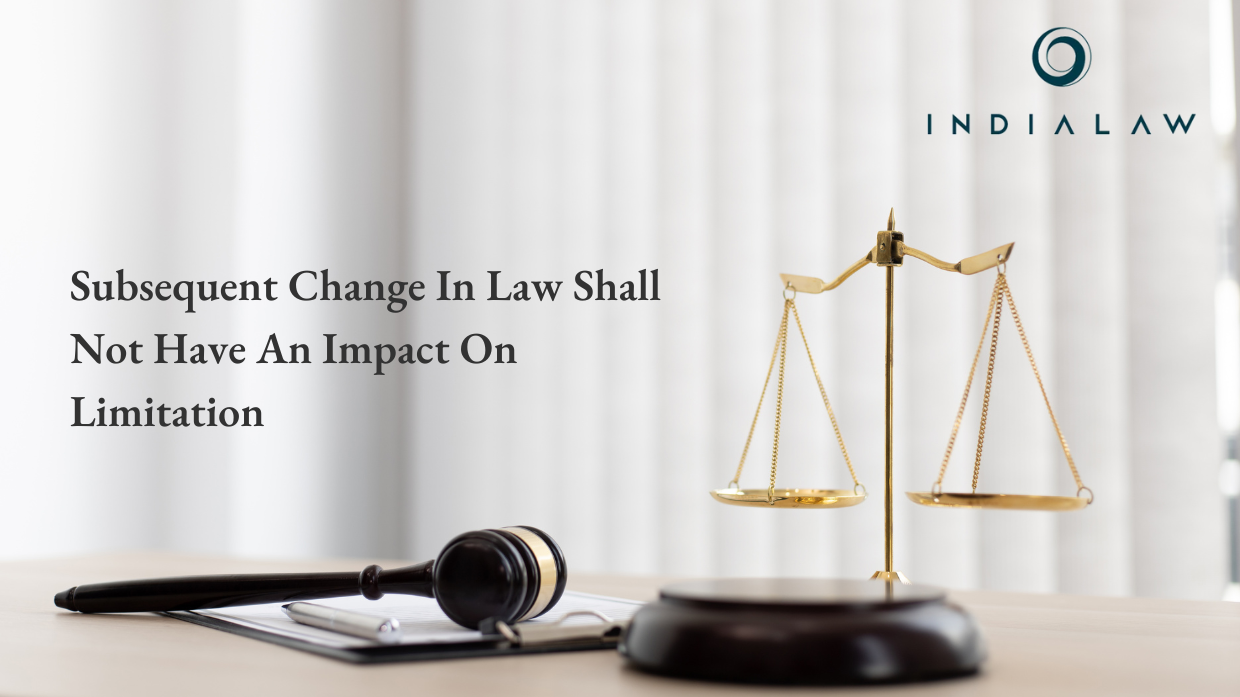Subsequent Change In Law Shall Not Have An Impact On Limitation

The Hon’ble Supreme Court (“SC”) in the case of Delhi Development Authority v. Tejpal & Ors[1]., the bench comprising of Justice Surya Kant, Justice Dipankar Datta and Justice Ujjal Bhuyan, ruled that a change in interpretation of law cannot be construed to grant a fresh period or extend the period of limitation period provided under the Limitation Act, 1963 so as to justify the delay in filing appropriate proceedings.
The Hon’ble SC in its Order dealt with appeals preferred by Delhi Development Authority (DDA), Government of National Capital of Delhi (GNCTD), Land Acquisition Collector (LAC), Delhi State Industrial and Infrastructure Development Corporation (DSIIDC), East Delhi Municipal Corporation and Delhi Metro Rail Corporation Ltd (DMRC), (“Appellants”) against various identical orders of the High Court of Delhi (“HC”), whereby acquisition proceedings had been declared to have lapsed in terms of section 24 (2) of the Right to Fair Compensation and Transparency in Land Acquisition Rehabilitation and Resettlement Act, 2013 (“new act”). Since, the majority of applications before the Hon’ble SC were filed seeking to condone an inordinate amount of delay in filing proceedings, filed against the Respondents, the Hon’ble SC considered and settled the issue of effect on limitation period upon subsequent change in interpretation of law.
A brief overview of facts considered by the Hon’ble SC were that several proceedings for land acquisition were initiated by the Appellants under the Land Acquisition Act, 1894 (“old Act”), for facilitating various development projects undertaken by the various state authorities in Delhi. During the process of land acquisition, multiple disputes arose between certain landowners and the Government, and as a consequence thereof several proceedings were initiated proceedings before relevant authorities and / or the Courts. Under the said old act, in some cases, the compensation amount was deposited in the treasury since the landowners did not come forward to receive the same. Similarly, possession could not be taken in some cases as the affected landowners had challenged the acquisition proceedings and had obtained stay orders in their favour.
Meanwhile, in the year 2013, the said new act was brought into force, thereby repealing the old act. Notably, section 24 of the new act provided that land acquisition proceedings initiated under the old act would be deemed to have lapsed in certain cases, including when compensation had not been paid or possession had not been taken.
One of the first cases interpreting section 24 (2) of the new act was the case of Pune Municipal Corporation v. Harakchand Solanki[2], where the Hon’ble SC laid down that depositing of compensation amount with the Government Treasury was held to not constitute payment of compensation for the purposes of section 24 (2) of the new actandsuch land acquisition proceedings were held to have lapsed.
In a subsequent judgement of Sree Balaji Nagar Residential Association v. State of Tamil Nadu[3], the Hon’ble SC held that period during which an order of stay is in operation is not excluded by section 24 (2) of the new act, consequently, the Hon’ble SC held that an operation of stay would not ameliorate a failure to take possession and that as such acquisition proceedings would be deemed to have lapsed.
Relying on these two decisions, the Respondent landowners, between 2014 and 2017, approached the Hon’ble HC seeking a declaration that the proceedings initiated by the Appellants against them have lapsed. The Hon’ble HC ruled in favour of the Respondent landowners by allowing their claims and declaring that the acquisition proceedings had lapsed.
The veracity of the aforesaid judgments, was considered by a three-judge bench of the Hon’ble SC in Indore Development Authority v. Shailendra[4]. The Hon’ble SC, by a three-judge bench over – ruled the said two decisions and laid down that the term “paid” in section 24 (2) of the new act is to be read as “tender” of payment, i.e. offer to pay and remarked that Pune Municipal Corporation (supra) judgment was passed per incuriam. The case of Shree Balaji Nagar Residential Association (supra) was also overruled, in so far, as it allowed landowners to unduly benefit from the orders of stay. It was after passing of this order the Appellants filed the present appeals, review petitions and miscellaneous application, seeking a favourable determination of their rights.
Meanwhile, in State of Haryana v. GD Goenka Tourism Corporation Ltd.[5], it was argued that since Pune Municipal Corporation (supra) and Shailendra (supra) were decided by a bench of equal strength, thus the issue should be referred to a lager bench.
Eventually, a five – judge bench decided these questions of law in Indore Development Authority v. Manoharlal[6] and the Hon’ble SC, inter alia, laid down that the terms “or” in section 24 (2) of the new act shall be read as “and”, such that for land acquisition proceedings to lapse under this section, neither compensation must have been paid nor the possession must have been taken. With respect to the payment of compensation, it was held that the term “paid” means tendering of payment and the term “deposit” in section 24 of the new act includes both the government treasury and the Reference Court. Hence, land acquisition proceedings cannot be deemed to have lapsed if compensation was tendered to the landowner and later deposited in the treasury. With respect to the possession, the Constitution Bench held that the period of stay granted in favour of landowners ought to be excluded. Consequently, Pune Municipal Corporation (supra) and Sree Balaji Nagar Residential Association (supra) were over – ruled. The Hon’ble SC also over – ruled Shailendra (supra), since the question of reading the conditions under section 24 (2) conjunctively (i.e. reading “or” as “and”) was considered by that case.
Following the Shailendra case and subsequently the Manoharlal case, numerous appeals were filed before the SC. All the appeals filed had one similar characteristic, i.e., they were all filed after the expiration of the limitation period.
The SC in the instant case refused to condone the delay in a majority of the appeals filed, their rationale was that if a subsequent change in interpretation of the law is accepted as a legitimate reason for condoning a delay, it would create a situation where numerous cases, including those that had relied on over – ruled judgments, would flood the court system seeking relief based on the new interpretation and will be prejudicial to the parties who have been given a favourable order.
Moreover, it was observed that subsequent overruling of a judgment will not come under the ambit of “sufficient cause” for the purposes of Section 5 of the Limitation Act. This is because when a case is over – ruled, only the binding nature of the precedent is taken away, but the decision taken based on such precedent persists. The Hon’ble SC also noted that the established term of limitation had already passed long before the judgments in the Shailendra case and Manoharlal case were delivered. This could be because the appellants would have felt that their case had no merits to let the period of limitation lapse.
The Hon’ble SC concluded that the ground of subsequent change in law can be used only when the case is sub judice.
Despite this, the delay was not condoned on the grounds of “subsequent change in law”, the same was granted on other grounds like public interest.
In the authors’ opinion, the judgment sets a precedent. The court refused to condone the delay in the interest of reducing the plethora of cases pending before the courts. Thus, inevitably reducing the number of cases being filed. In addition to this, the case also suggests that irregularity in rulings would act as a hindrance to legal proceedings and would lead to constant reconsideration of the cases sought.
[1] 2024 SCC OnLine SC 1091.
[2] (2014) 3 SCC 183.
[3] (2015) 3 SCC 353.
[4] (2018) 1 SCC 733.
[5] (2018) 3 SCC 585.
[6] (2020) 8 SCC 129.
By entering the email address you agree to our Privacy Policy.



